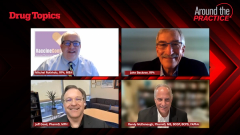
Expanding the Reach of Public Health to Assist Influenza Immunization Rates
The panel provides opinions on the incorporation of vaccine awareness and administration from public and state levels.
Episodes in this series

Mitchel Rothholz, RPh, MBA: Randy, you’ve done a lot of work with your local health department. Do you have any advice for the audience on how you approach that?
Randy McDonough, PharmD, MS, BCGP, BCPS, FAPhA: I tell people that they’ve got to know that you’re there, what you’re willing to do, and that you want to be a part of the solution. Once the public health department saw that and saw our capabilities, they were all about it. What’s interesting is that we did some pilot work where we were doing social determinants of health surveys of our patients, and we identified things that we didn’t realize were going on within our own patient population. Then we started talking about outreach and saying, “Could we train someone within our pharmacy to be a community health worker?”
Now we’re working with the state public health department and our local public health department, which have money to train people to be community health workers. We’re jumping in with both feet saying, “We need to have that.” Because as we expand the number of pharmacies we have, and as we go into new communities, my common statement to all the stakeholders is: We’re here for the community. We’re here to provide solutions to problems that you might be experiencing in the community. The more I can get people trained within my practice in nontraditional roles, such as community health worker, the better we’re able to address those issues.
Mitchel Rothholz, RPh, MBA: Jeff, you’ve been active at the state level through the California Immunization Coalition, having served as president of that group. Is there any advice you can give to our audience in terms of connecting at the state level so we aren’t just showing up because there’s some low-hanging fruit and that we’re there as long-term partners?
Jeff Goad, PharmD, MPH: Yes, but Randy is right. It’s showing up. You have to be at the meetings. You have to go to their conferences. You have to connect with them. You have to get on their local advisory groups. Most counties have an immunization coalition that feeds up into a statewide one. You have to be there. They’ll sit around the table and say, “Why isn’t pharmacy doing this?” If pharmacy isn’t there to say, “Here’s what we’re doing, and this is how we can help you,” then our voices are never heard. I agree: you have to show up. Once you’re there, you have to contribute. You can’t be a wallflower. You can’t be in a defensive posture. You have to be positive and say, “I see your perception. Let’s see how we can work to change that. What would you like to see in your pharmacy? What would you like to see in pharmacists in your county or in your state?” It’s showing up and then coming with productive ideas.
Randy McDonough, PharmD, MS, BCGP, BCPS, FAPhA: Mitch, I have 1 thing to add. Neither the emergency management agency nor the public health department knew what Towncrest Pharmacy [in Iowa City] was until I went to them and asked, “What are you guys doing about this whole COVID-19 response?” They said, “We’ve got it under control.” I said, “You might have it under control with your group, but I’m in community pharmacy, and all the community pharmacists I’m working with know nothing about what you’re doing. This is going to spill out beyond hospitals, so what are you doing?” They said, “We didn’t think about that.”
They brought me into their meetings, which met daily for an hour to talk about the response and what’s going on, and all of a sudden they started realizing the information that we had as pharmacists was something they were lacking. We became a permanent member of that group, which led to us being one of the first pharmacies to get access to the Pfizer vaccine when it came out, in December 2020, because they saw us as one of the solutions to helping them get the vaccine out to the people. It’s showing up and being persistent. They may not understand what you can provide to them and their organizations, but be there as a solution, and then they’ll catch on that this is of value to them.
Mitchel Rothholz, RPh, MBA: One thing I’ve [picked up] through all the years working in this area is that as they get to know us more, we don’t have to do the talking. They talk on our behalf. One challenge is that they need to see pharmacy as an extension of public health. We’re not there competing; we’re collaborating. That’s the important part during flu season that pharmacies play a major role in: the consistency in messaging and overcoming some of the misinformation in the community. When they see us as a way of getting that information out there consistently across all health care professions, when it’s working to its maximum, that’s a value that’s unbeatable. That’s the important part, that we in community pharmacy and pharmacy across the spectrum have that influence.
Transcript edited for clarity.
Newsletter
Pharmacy practice is always changing. Stay ahead of the curve with the Drug Topics newsletter and get the latest drug information, industry trends, and patient care tips.
























